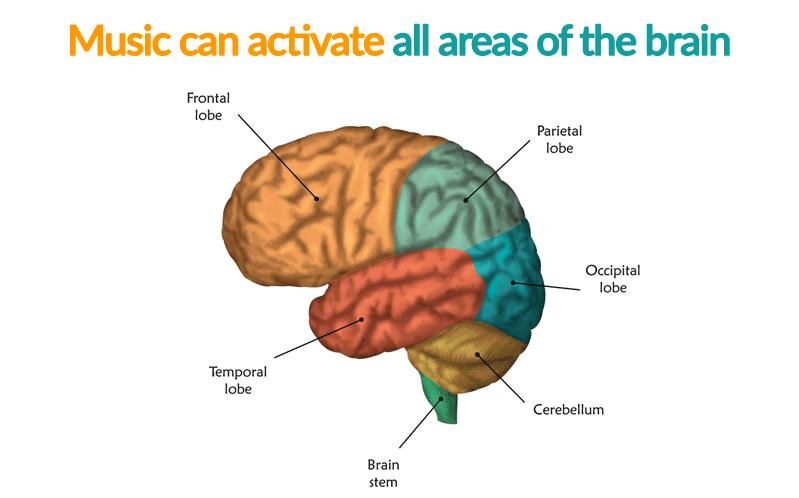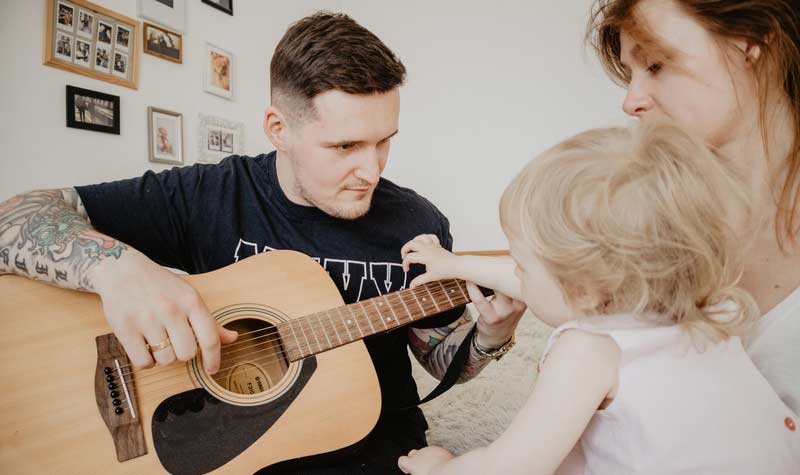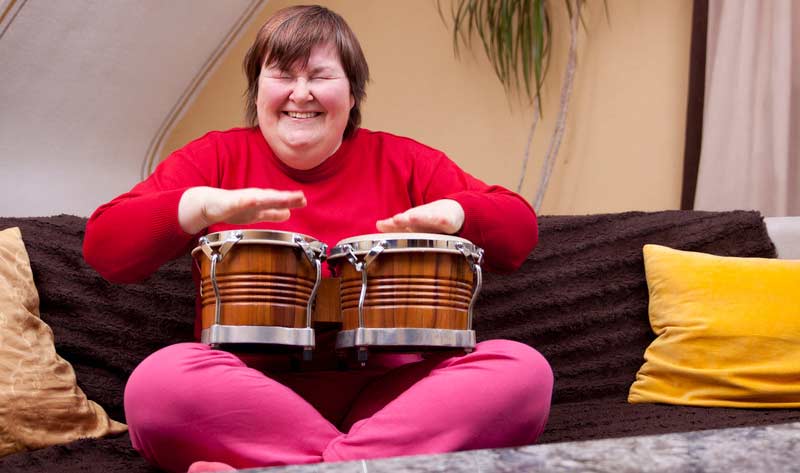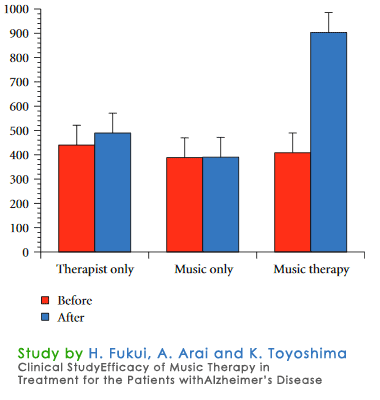Music therapy is something that many of us might not be familiar with. However, it has been used to treat a range of mental health issues. It’s only natural that you’d want to learn more about its magical qualities, especially since it can help with physical disorders as well.
According to University of Pennsylvania researchers (link to the study: BMJ journal) music showed a significant decrease of preoperative anxiety on patients. The were listening to a very relaxing song before an operation.
There are many other success stories. For example parents used music therapy on their blind child. The therapy can help them make gains on every area of development.
The branch of research which explores how music effects the brain is called neuromusicology.

We’ll be running through everything you need to know about it.
What Is Music Therapy?
All in all, music therapy is defined as (Maratos, Gold, Wang & Crawford, 2008):
the use of music and its facets to improve, restore or maintain health
If you play an instrument such as the piano, you may have noticed how the melodies soothe you. This is because music has a positive effect on the brain compared to most other things.
Not all therapists can treat people using music. To do so, you need to be highly trained.
If you’re planning on using it to treat things like physical issues instead of mental health issues, you need to be trained in that field and not just be a music therapist.
A study, that was carried out in 2006, (Svansdottir and Snaedal 2006) shows that there is a positive effect of music therapy on patients. The Therapy took 6 weeks and was carried out by qualfied music therapists.
Study: 2006
-
Mood Enhancement
13.6%
-
Reducing Stress/Agitation
39.91%
-
Increasing Levels of Relaxation
7.89%
-
Enjoyment & Other Benefits
18.42%
History Of Music Therapy
The use of music to treat others can be traced back to Ancient Egypt. Egyptian medical papyri talk about how doctors would use music to treat their patients, way back in 1500 BCE.
In fact, the healing properties of music are evident in the Bible as well. In 1 Samuel 16:14-16, 21-23, it reads:
Whenever the evil spirit from God bothered Saul, David would play his harp. Saul would relax and feel better, and the evil spirit would go away.
In this day and age, music therapy is used primarily to target mental health problems. The use of it to tackle these issues was officially introduced by the Ancient Greeks. Many who recommended its use for treating mental issues were leading minds. They include:
- Pythagoras
- Aristotle
- Plato
Famed mathematician Pythagoras continuously stated how music could help balance emotions and relieve many from intrusive thoughts. Thousands of years later we know he’s never been more right.
Modern music therapy came into being in the 18th century. The first scientific paper on it was published in 1789 and titled ‘Music Psychically Considered’.
Over time, it was utilized by doctors. Anesthetics weren’t so widespread, hence doctors in the late 1800’s used music to soothe their patients. This was especially the case during labor as obstetricians had phonographs by their side.
This widespread use finally made it a serious subject as Columbia University issued courses on ‘Musicotherapy’ in 1919.
Let’s run through which aspects of music affects which parts of the brain:
- The prefrontal cortex
- Cerebellum
- Temporal lobe
- Left frontal cortex
- Left parietal cortex
- Right cerebellum
- Wernicke’s area
- Broca’s area
- Visual cortex
- Motor cortex

What Are The Types Of Music Therapy?
Mainly, there are 2 types of music therapy that you can treat patients with (some people call it ‘Sound Healing’). These are receptive and active. From their names, you get an idea of what they are.
Receptive Music Therapy
You listen to music that your therapist picks out for you. The music he or she picks is especially for you and it helps with a range of emotions.
Active Music Therapy
Active music therapy is the opposite of its receptive counterpart. Instead of the therapist choosing music, he plays something while you’re in the room or the two of you collaborate on a piece together.
This is either done by playing instruments or singing. Some experts even use different kinds of lights while playing music.
How Does Music Therapy Work?
For music therapy to help mental health issues (which it’s primarily used for) it needs to affect aspects of our brain. These aspects make it easier for us to deal with our problems.

There are 5 them that we know about (Koelsch, 2009), so, let’s discuss them:
It Affects Attention
Music therapy affecting attention is called the ‘modulation of attention’. When you hear music, your mind will drift away from whatever you’re thinking about, losing focus.
This works well when you’re constantly thinking about negative stimuli that bring about anxiety or depressive bouts.
It Affects Emotion
When it affects emotions, it’s called the ‘modulation of emotions’. Music does this by stimulating the areas of the brain that are involved in the generation or maintenance of emotions. Most of the time, it affects these 2 regions but it also has an effect on the parts that initiates and terminates emotions as well.
It Affects Behavior
When music therapy affects your behavior, it’s called the ‘modulation of behavior’ . It can do this by bringing about movement patterns that are involved primarily in walking and speaking.
It Affects Communication
By affecting your behavior, it can get you to communicate (as we just discussed). However, music can also tackle parts that are solely responsible for how well you get your ideas across.
The way it does this is thorough and a lot of research has been done on it. There are 3 basic ways (Geretsegger et al. 2014):
- Music improvisation helps with nonverbal and verbal communication
- Music therapy helps people who are nonverbal to communicate with others
- It allows people to interact more emotionally
What Can You Treat With Music Therapy?
All in all, music therapy can treat a number of problems. Let’s look at some of them.
Mental
Let’s go through some mental health issues it can tackle.

Autism
When suffering from autism, you may have bad motor skills. Music therapy helps you refine these skills. A study conducted by Thenille Braun Janzen and Michael H. Thaut showed that music helped children with autism refine their focus as they learned to listen to music.
This isn’t the only way music therapy can help children with autism. It teaches them social skills as they have to interact with the therapist actively. These skills can be applied in future circumstances.
Anxiety
A 2017 theoretical review showed that music therapy helped patients suffering from PTSD. Focusing on the music made them forget about their triggers, getting rid of a lot of anxiety.
Depression
By focusing on creating music, the therapy has shown to reduce the internalization of emotions that makes depression so severe.
Dementia
You’ll be happy to know that music therapy can help anyone that’s suffering from dementia. It can’t cure the disease but it can make life more livable.
It does this by improving the well-being of the patients. This was seen by Dr. Hanne Mette Riddler who used music to help the emotional responses of dementia patients in South Africa.
A meta-study showed that music therapy helped the elderly suffering from dementia reduce their restlessness and stress, helping them bond with their caregiver better.
Another study shows these fantastic results:

Mother-Child Bonding
If you’re a parent, you may be distraught by the fact that your little one isn’t bonding with you. Music therapy can help with this as singing together can cause a bonding experience.
Medical
Yes, it can be used for your medical health as well.
Heart Disease
Heart disease is one of the leading causes of death among adults. To treat it, you’ll have to spend on expensive medication.
With music therapy, you improve heart rate and respiration as you’re more relaxed, thus reducing your blood pressure (Cochrane, 2013)
Strokes
Strokes are pretty scary. When it happens, you lose function in much of your body. Physical therapy will help but music therapy can accelerate its effects.
The rhythm of the music can help you remember important motor skills. And the music helps stroke patients understand their emotions better, letting them communicate easily.
Aphasia
Aphasia is a disorder not many of us have heard about. It’s when you understand language and have the necessary motor skills to speak but unfortunately, your frontal lobe is too damaged. This causes you to have difficulty getting your words out. If you do get them out, you’ll find it hard to use proper syntax.
Music therapy has shown to help with this as people with aphasia can get their words fully across through singing. Thus, melodic intonation therapy is a widespread tool when dealing with the disorder.
Unfortunately, we don’t really know how music does this, but it has been shown to work well.
Cancer
If you have cancer, chemotherapy is a must. It helps eradicate cancer cells but leaves patients very weak. This is where music therapy comes in as it can soothe take a patient’s mind off the pain.
A 2016 metanalysis showed that it helped chemo patients tackle stress, anxiety and depression. This made the treatment more bearable.
When Should Music Therapy Not Be Used?
Music therapy should not be used if the person undergoing treatment doesn’t want it. The effects of the music will be quite low and in the end, it would be a waste of money.
The therapy should not be used as the only form of treatment. If you’re suffering from Depression, the music will help but it’s not supposed to be a solo treatment. It’s important that you utilize music therapy hand-in-hand with your medication. The same goes for Anxiety and everything else.
This is especially true for physical conditions like heart disease or when you’re recovering from a stroke.
How Much Does Music Therapy Cost?
Music therapy isn’t the cheapest thing out there. If you’re wondering how much it’ll cost you, this will depend on where you live.
In general, it can be quite pricey.
Of course, this depends on the clinic you go to as the more higher-end it is, the more expensive their services will be.
In fact, the equipment used will determine how expensive the sessions can get. You may also conduct activities with the music which would influence the final amount.
Unfortunately, you can’t go to therapy once a month. When undergoing music therapy sessions, you have to go at least once a week, even more depending on what your doctor recommends.
Most centers allow you to pay for your month’s sessions in advance, however.
How Effective Is Music Therapy?
Music therapy is incredibly effective. As we discussed above, it can be used to treat a wide range of physical and mental health issues. What’s best about this is that research has been done to prove its effects.
It can help treat:
- Heart disease
- Cancer
- Aphasia
- Autism
- PTSD
- Strokes
- Mother-infant bonding
- Anxiety
- Depression
In fact, these are just a few things music therapy can help with. There are countless more and as our knowledge of how it works expands, we will be able to treat other conditions with it.
There are many famous blind piano players too.
Who Can Benefit From Music Therapy?
Music therapy is used for a range of things.
You don’t have to suffer from anything serious to go for music therapy sessions. You may just have had a stressful week, so a visit to a music therapist can relieve you of your stress and help you feel more relaxed.
Playing instruments like the piano at home could help with this too. Even cheap pianos like the Yamaha EZ-220 work for this.
This doesn’t negate the fact that it’s mostly used to tackle more serious mental health issues.
Conclusion
It’s quite clear that music therapy is a form of treatment that should be taken very seriously. It can help with many things, and fortunately, it’s becoming more widely available.
That being said, you should be careful to ensure that it’s not the only form of treatment you’re undergoing as it’s not fit to be the only remedy for most illnesses. It works hand-in-hand with other forms of treatment and can help you get better.
There is a great deal of evidence showing that music therapy has been used throughout history, dating back to the Ancient Egyptians. This shows how powerful music really is.
Resources and External Links:

